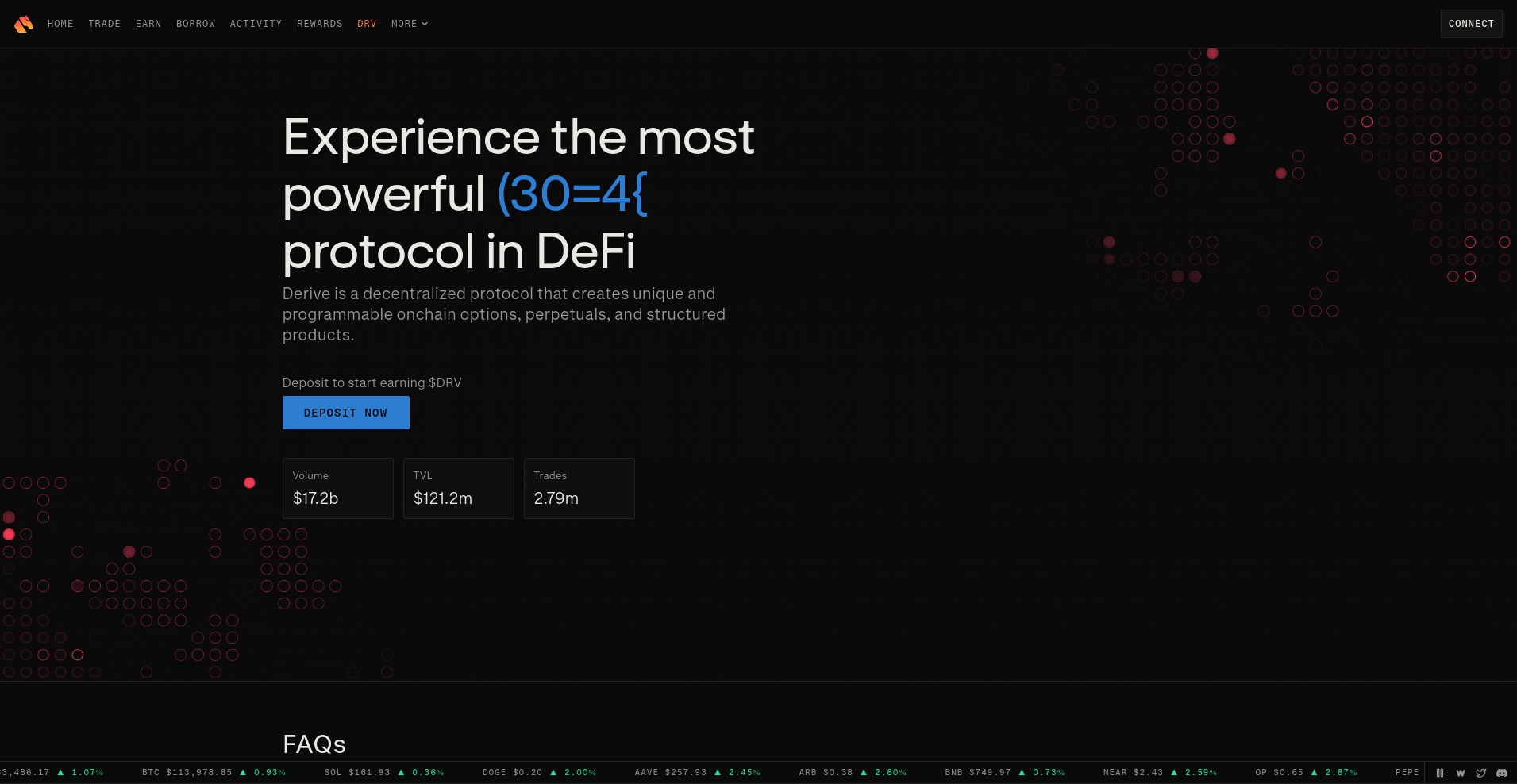Lyra Finance ($LYRA) Review: A Data-Driven Look at Its Legitimacy and Risks

What Is Lyra Finance: An Introduction
Lyra Finance is a decentralized options protocol that aims to facilitate on-chain derivatives trading within the Ethereum ecosystem. Leveraging smart contract technology, Lyra provides users with the ability to create, buy, and sell options and other financial instruments directly on the blockchain. The project states its goal as building a flexible and efficient platform for derivatives, aspiring to automate complex financial strategies in a permissionless environment.
This review offers an impartial, evidence-based analysis of Lyra Finance's strengths as well as potential weaknesses, focusing on aspects such as security, project transparency, tokenomics, and overall risk factors. The goal is to equip potential investors and users with objective insights to assess the platform's legitimacy and long-term viability.
The Team and Roadmap Evaluation
Lyra Finance's team comprises a mix of anonymous and known contributors, typical of many DeFi projects. While some development activity suggests ongoing progress, the lack of publicly detailed backgrounds for core team members raises questions about their credibility and experience. Projects with transparent teams tend to foster greater trustworthiness, especially concerning security and future development.
Evaluating the roadmap, Lyra has outlined key milestones such as expanding derivative offerings, integrating layer-2 solutions for scalability, and enhancing governance features. The stated roadmap includes targets like:
- Launch of additional option types — Expected to broaden trading flexibility.
- Layer-2 integrations — Aimed at reducing transaction costs and increasing throughput.
- Community governance enhancements — To empower token holders with more control over platform direction.
- Partnership developments — Expanding ecosystem integrations and outreach.
While these milestones appear consistent with industry standards, the actual execution depends heavily on team capacity and external factors. Given the current stage, they have demonstrated some commitment to delivering on their promises, but a cautious approach is advisable as the project still faces execution risks.
Assessing the Security and Integrity of Lyra Finance
Lyra Finance's security analysis is primarily based on audit reports from credible firms such as Certik, TrustSecurity, iOSiro, Sherlock, and Halborn. These audits provide a foundational assessment of the platform's smart contract robustness and vulnerability management.
Overall, the audits report a number of key points:
- Audit coverage: The project's smart contracts have undergone multiple audits, covering core components like the options engine, protocol governance, and vault management.
- Vulnerabilities: A few low to medium severity vulnerabilities were identified—such as small reentrancy issues, access control concerns, and logic inconsistencies—but none of these were deemed critical or exploitable in the current configurations. This expands on the audit findings mentioned for AZCOINER and general smart contract risks.
- Audit scores & ratings: The platform received a moderate rating (around 6.4/10), indicative of room for improvement, primarily in comprehensive vulnerability mitigation.
- Security controls: The system incorporates standard measures such as multi-signature governance, timelocks, and formal verification where applicable.
Nevertheless, audit reports admit that some centralized control elements exist, which could be points of concern for true decentralization. Importantly, no known incidents or exploits have been publicly reported, but the presence of vulnerabilities signifies ongoing security risks inherent to DeFi platforms. Investors should recognize that smart contract security remains an evolving field, and audits, while crucial, do not completely eliminate risks.
A Breakdown of Lyra Finance Tokenomics
The native token of Lyra Finance, $LYRA, plays a vital role in governance, fee accrual, and incentive mechanisms for liquidity providers and traders. Analyzing the tokenomics provides insight into the sustainability and potential risks associated with the project.
- Total Supply: 1,000,000,000 LYRA tokens, with a significant portion allocated for team, advisors, ecosystem rewards, and community incentives.
- Market Cap & Liquidity: As of current data, the market cap is approximately $174,950, with a circulating supply of around 623.6 million LYRA. Trading volume in the past 24 hours stands at ~$5.41, indicating moderate liquidity.
- Distribution:
- Team & Advisors: Allocation typically subject to vesting schedules, often ranging from 1 to 4 years, designed to align interests but potentially vesting risks.
- Community & Ecosystem: Incentives via liquidity mining, staking, and governance rewards, intended to foster user engagement.
- Private & Public Sale: Presumably a portion reserved for early investors, with lock-up periods to prevent immediate large sell-offs.
- Utility & Incentives: Primarily used for governance voting and protocol fee sharing, which ties token value to platform performance.
- Inflation & Deflation Mechanics: Details on inflationary issuance or buyback mechanisms are limited. Without explicit deflationary measures, there is potential for dilution over time, affecting long-term token value. Understanding tokenomics design is crucial for any crypto investment.
The economic model's sustainability hinges on consistent platform usage and token utility. While active trading and derivatives volume may positively influence $LYRA's value, reliance on continuous user growth and volume is a typical risk. The presence of substantial token reserves allocated for team and ecosystem incentives could also pose resale risks if these tokens are released into the market prematurely.
Assessing Lyra Finance's Development and Ecosystem Activity
Current indicators show that Lyra Finance maintains active development efforts, reflected in regular updates, multiple audit reports, and community engagement initiatives. The platform supports high-volume derivatives trading, with a recent 24-hour volume of approximately $17.2 billion, suggesting strong user activity and liquidity.
However, it is essential to distinguish between marketing hype and genuine progress. The deployment of Layer-2 integrations, new derivative offerings, and governance improvements indicates ongoing development efforts. Nonetheless, a significant share of ecosystem growth seems driven by user engagement in trading rather than innovative new products or technological breakthroughs.
Long-term ecosystem sustainability will depend on how well Lyra can expand its user base, ensure security, and foster community governance. While the current traction looks promising, potential investors should monitor development updates, platform performance, and community feedback to validate claims of consistent growth.
What Investors Should Know About Lyra Finance's Legal & Terms
Lyra Finance’s Terms of Use and legal documentation outline standard disclaimers and platform policies. Notably, the project imposes restrictions on residents of the United States, China, and several other jurisdictions, reflecting regulatory compliance efforts.
Section-specific clauses to highlight include:
- Regional Restrictions: Users from high-regulation countries are explicitly barred, which might impact global accessibility and could be viewed as a centralization of compliance considerations.
- Risk Disclosures: As typical with DeFi projects, the documentation emphasizes the risks involved, including smart contract risk, market volatility, and regulatory uncertainty.
- Legal Liability: The project disclaims liability for losses caused by platform use, a common but critical clause that limits recourse for investors.
Overall, the legal framework appears standard for DeFi protocols, but potential users should remain cautious of regulatory developments and ensure compliance with local laws before participating.
Final Analysis: The Investment Case for Lyra Finance
Lyra Finance presents itself as a technically sophisticated and actively developed DeFi derivatives platform. Its partnerships with reputable audit firms and the deployment of Layer-2 solutions suggest a focus on security and scalability. The project’s governance token, $LYRA, indicates an intention toward community control and incentivization.
However, several inherent risks temper enthusiasm. The anonymous team and moderate audit scores introduce questions about long-term reliability. Geographical restrictions may prevent broader adoption, and the platform's security, while robust, is not foolproof. The tokenomics, with considerable supply and reliance on continued platform volume, present potential dilution and volatility concerns.
-
Pros / Strengths:
- Active derivatives trading volume indicates genuine user engagement
- Multiple reputable audits enhance confidence in security measures
- Layer-2 integration promises scalability improvements
- Decentralized governance via $LYRA token fosters community involvement
-
Cons / Risks:
- Team transparency and experience remain limited
- Smart contract vulnerabilities, while addressed, still exist
- Geographical restrictions restrict global accessibility
- Market reliance on trading volume may affect token value stability
- Potential token dilution from allocations to team and ecosystem incentives
In conclusion, Lyra Finance exhibits promising signs of active development, robust security practices, and community engagement. Nonetheless, the project's inherent risks—particularly around decentralization, security, and regulatory compliance—must be carefully considered. As with all DeFi investments, thorough due diligence and risk management are essential for anyone contemplating exposure to $LYRA.

Jessica Taylor
NFT Market Data Scientist
Data scientist specializing in the NFT market. I analyze on-chain data to detect wash trading, bot activity, and other manipulations that are invisible to the naked eye.
Similar Projects
-
Baby Grok
Baby Grok ($BABYGROK) Review: Tech, Risks & Tokenomics Explained
-
Gnars
Review of Gnars Crypto Project - Is It a Safe Crypto Scam Checker or Legitimate?
-
OAX
OAX Review: Is This Crypto Scam or Legit? Scam Check & Analysis
-
Axion
Axion ($AXN) Review: Risks, Technology & Long-Term Potential
-
Airtok
In-Depth Review of Airtok: Crypto Project Scam Checker & Honest Review